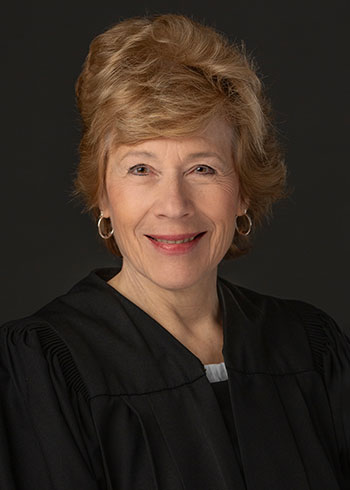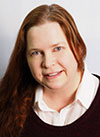
Photo courtesy Thompson Photo Imagery.
Those who talk about Judge Barbara Key and her work use these words: fair, intelligent, calm and reasoned, the epitome of justice, intense and intentional, well-researched, an example, promoted civility in the law, having a signature look of skepticism, and attuned to vulnerable litigants.
Judge Key, now retired after serving four terms on the Winnebago County Circuit Court (1998 to 2022), is the 2025 recipient of the State Bar of Wisconsin Bench and Bar Committee’s Lifetime Jurist Award.
The award recognizes jurists who, during their tenure on the bench, were fair and impartial and demonstrated high ideals and personal character along with outstanding, long-term judicial service.
The legacy she hopes for: “I want to be known as having done my work on each case. And that people knew they were heard and that they’d get a fair shot.”
Path to Bench
Judge Key has fond memories of growing up in Sussex, at the time a small town near Milwaukee. “My dad was a machinist in Milwaukee, and mom was a school food service coordinator. They encouraged us to get an education and encouraged me in what I wanted to do.”
 Shannon Green is communications writer for the State Bar of Wisconsin, Madison. She can be reached by
email or by phone at (608) 250-6135.
Shannon Green is communications writer for the State Bar of Wisconsin, Madison. She can be reached by
email or by phone at (608) 250-6135.
At first, she wanted to be a teacher. Heading to U.W.-Madison for her undergraduate degree, she chose journalism, then later added political science. “It was the mass communications law class that really sparked my interest in law,” she said.
In her freshman year, she joined the U.W. Marching Band, playing clarinet under its famous director, Michael Leckrone. This was 1975, the second year women were allowed in the band. “It was a great experience,” she said. “We worked hard and had a good time. Mike was absolutely fantastic.”
After college, she worked at a local radio station in Milwaukee: WBCS. “I knew early on that wasn’t where I wanted to stay,” she said. She wanted to be more involved in the cases, not just reporting on them. So, she took the LSAT – and was accepted at the University of Wisconsin Law School.
As a student contemplating areas to practice, criminal law was out. But in the summer of her 1L year, she worked at Legal Assistance to Institutionalized Persons (LAIP), providing legal assistance to people in prison under supervision of a law professor. “That sparked my interest in criminal law,” she said.
In the summer of her 2L year, she did a prosecutor internship in the district attorney’s office in Eagle River. “That’s when I realized I really liked trying cases,” she said. “It was fascinating, and it gave me confidence that I could do this. A really, really good practical experience.”
From ADA to Judge
Following graduation and admission to the bar in 1983, Judge Key headed to Wisconsin Rapids to the district attorney’s office under the direction of Kevin Potter. “He was great to work for, and I got a lot of trial experience.”
In 1985, she moved to Oshkosh to be closer to family in Sussex, working with then-District Attorney Peg Lautenschlager in Winnebago County. They started at the same time. “We were both sworn in together,” Judge Key said.
Judge Key worked as deputy district attorney (1985-89), then went into private practice, doing criminal defense and personal injury cases. “The experience in criminal defense work was invaluable,” she said. “It was an area of law where I knew I could offer effective representation.”
At that time she realized how important it is to treat everyone involved in the criminal justice system with respect and dignity – sentiments that stayed through her years as a circuit court judge. “That’s part of respecting the entire process, and that’s what we’re all about.”
In 1991, she became court commissioner for Winnebago County Circuit Court. “I did criminal bond hearings, initial hearings and some trials on small-claims cases, first traffic hearings, restraining orders and injunctions, a lot of juvenile custody hearings. It was a high-volume court, and it was an amazing experience,” she said. “I don’t think I would’ve considered running for judge without it.”
In 1998, Judge Thomas S. Williams announced his retirement, and the Winnebago County judges encouraged Key to run for the position. “They were all very supportive, including Judge Williams,” she said.
She remembers the election night party on April 7, 1998. To deal with the stress of waiting for the results, she sat on a rocker with her kids – ages 1, 5, and 7. “I literally sat with them saying to myself, ‘What’s most important in life? Not this race’ … even though you have put your heart and soul into the campaign.”
She won. “I was 40, and the first female judge in Winnebago County – though I didn’t run on that point.” And it wasn’t a big deal as she started her first term. “The judges were kind, encouraging, and helpful. I had worked for them as court commissioner and we already worked well together,” she said.
Judge Key was reelected in 2004, 2010, and 2016, and retired in 2022.
Being Smart on Crime
Here’s the difference between working as a court commissioner and as a judge: “There’s a different level of responsibility and complexity to what you are doing. You have potentially more impact on people involved, and if you legally don’t make the correct decision, the consequences are significant,” Judge Key said.
Winnebago County was at the forefront, with Judge Key involved, in developing and organizing mediation services in the early 1990s. “Attorneys were concerned mediation would have a negative impact on their practice. Many were against mediation in general. Thankfully, it is much different now,” she said. “Sometimes the best justice is where people come with their own resolution for their own conflict, that’s what mediation is all about.”
After experiencing the trend in the 1980s and 1990s to be “tough on crime” (“I was part of that as a prosecutor,” she said), Judge Key assisted Winnebago County in becoming “smart on crime.” Rather than years of incarceration, it involves working with nonviolent defendants to get them back into their communities via treatment courts. “There was a hurdle” in starting treatment courts, but after working on training and witnessing how they work in other jurisdictions, “the community embraced the concept,” she said.
“The bottom line is that treatment courts are the right thing to do when the offender isn’t a danger to society.” Judge Key served as a drug court judge for the first 10 years of the Winnebago County Drug Court.
Judge Key also was active in judicial education. She was involved for many years in committee work, including on the Civil Jury Instructions Committee that edits Wisconsin’s civil jury instructions, and the State Bar of Wisconsin PINNACLE®
Wisconsin Judicial Benchbook: Criminal and Traffic. She also was a lecturer and associate dean for the Judicial College.
“Being involved on these committees really helps to stay educated on evolving law,” she said. “It’s amazing what you can learn listening to attorneys’ and judges’ interpretations of the law.”
There’s This Thing Called ‘Zoom’
Judge Key was in Arizona in March 2020 “when everything hit the fan.” They heard Dane County had closed its courts. “We got on a plane the next day.”
Appointed Chief Judge of the Fourth Judicial District in 2017, Judge Key was a key figure in helping the courts adjust to the new pandemic reality. “I’m not the most technologically savvy,” Judge Key admitted. But what came with the COVID-19 pandemic was a requirement to get onboard with online hearings – and everyone learned.
“When you look back, we all went through this. And honestly, it was a time we can be proud of,” she said, because the courts pivoted very quickly to remote hearings. Judge Key vividly recalls Judge Randy Koschnick – then director of state courts – “telling us about this thing called Zoom. We learned how to get this going for the entire state.” Within a short time, “we were holding hearings via Zoom, and I was holding court from a room in my house.”
Their quick efforts helped Winnebago County courts not fall too far behind on their schedule. “Before I retired in 2022, I did all I could to take care of those cases,” she said.
Do Your Homework
Judge Key admits that she had to work on “not being so intense on the calendar (backlog),” balancing giving attorneys enough time to work on the case while still moving it forward. “That was one philosophy I had: I did not want cases to languish. Because when time lapses, witnesses’ memories aren’t as good, victims are negatively impacted, and you’ve got people out on bond or in custody awaiting trial for way too long,” she said.
For new judges, she has this advice, “Do your homework. Law is constantly evolving. It is very apparent to judges which attorneys prepared well for their hearing.”
She also advises: Be patient. “That’s something I always had to work on,” she admitted. “There is a lot that occurs day in and day out in court that can get incredibly challenging, where tensions can increase exponentially. Stopping to take that deep breath never hurts!”
In receiving this award, “I have an overwhelming sense of ‘wow.’ I never would have expected something like this. It is beyond anything I would’ve thought I’d ever receive. I am extremely honored that my bench and bar colleagues found me worthy of this award and thankful to those who helped me along the way to what has been a truly fulfilling and amazing career.”
» Cite this article:
98 Wis. Law. 22-24 (May 2025).
